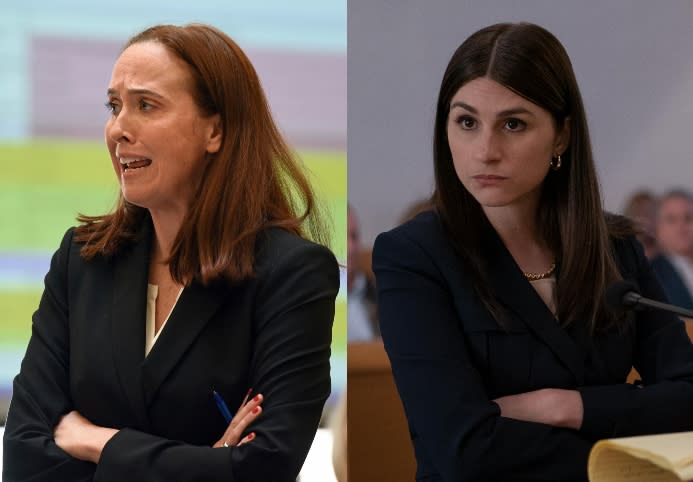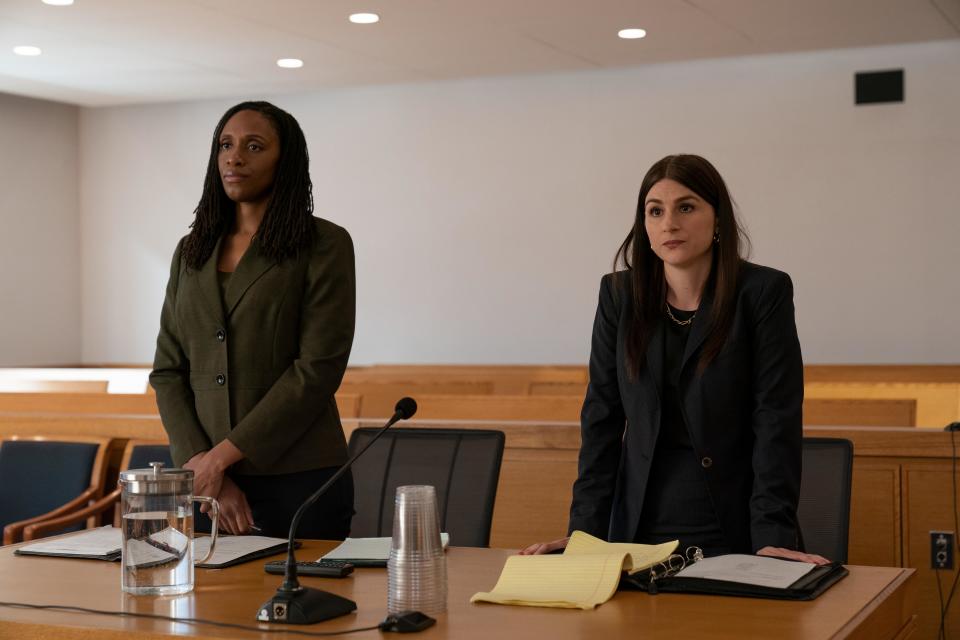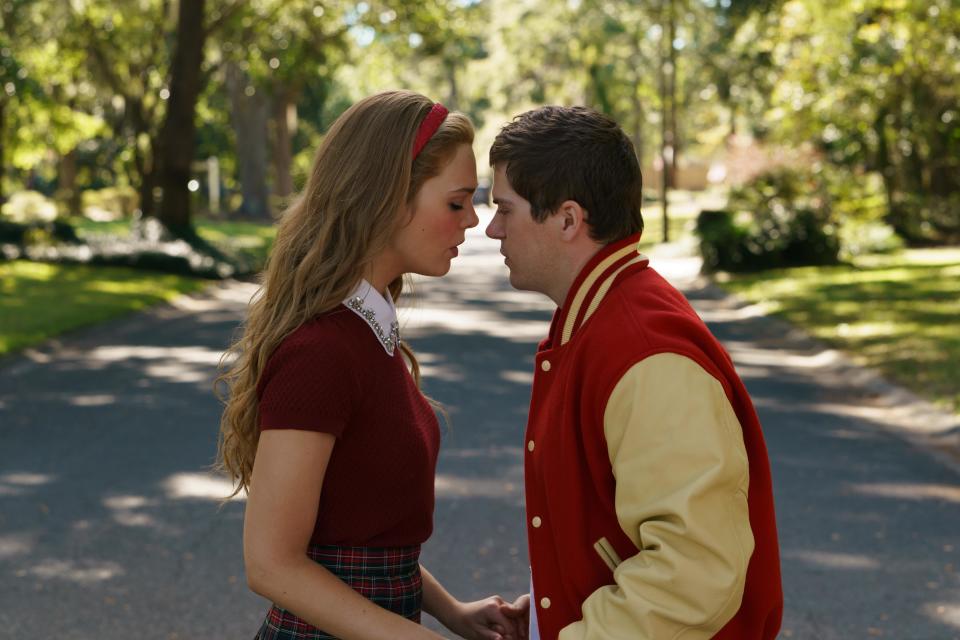Aya Cash Has Her Own Take on the Michelle Carter Case Behind 'The Girl From Plainville'

- Oops!Something went wrong.Please try again later.
- Oops!Something went wrong.Please try again later.
- Oops!Something went wrong.Please try again later.
If you purchase an independently reviewed product or service through a link on our website, SheKnows may receive an affiliate commission.
Aya Cash, the enigmatic star of cult-favorite You’re The Worst and Stormfront in superhero series The Boys, has a hard job in The Girl From Plainville, a dramatized take on the 2017 trial of Michelle Carter (Elle Fanning) and her involvement via texting in boyfriend Conrad Roy III’s (Colton Ryan) suicide. Cash plays Katie Rayburn in the new Hulu series, the reluctantly-roped-in prosecutor in Carter’s case who ends up pursuing the teen’s conviction with a vengeance. When Carter is charged with involuntary manslaughter, it’s a landmark verdict with far-reaching implications about how the law treats virtual presence, and it’s Rayburn who’s largely credited with setting that precedent. What Rayburn said in court about the case is well-documented, but Cash had little else to go on when imagining how this character privately wrestled with the implications of her verdict. I spoke with her about the line between fact and fiction, how she feels about Michelle Carter, her history of working on projects that meaningfully discuss mental illness, and more below.
More from SheKnows
Cash’s first exposure to Katie Rayburn was the same as mine: Erin Lee Carr’s two-part documentary I Love You, Now Die for HBO in 2019, which reviews the events of the trial and speaks to those close to the case about what happened. Other than that, Cash says she relied on “YouTube clips from articles” and the reassurance from series creators Liz Hannah and Patrick Macmanus that they wanted her to create a character, not a “mimic” of Rayburn herself.
'I Love You, Now Die'
$9.99
Sign Up
“Obviously, Michelle Carter is much more known and it’s important that they look alike and that Elle [Fanning] looks like her and walks like her,” Cash explained. “But Liz and Patrick were clear that they wanted this to be a jumping-off point. So we’ll do things like maybe paint her nails the same color, but my hair color wasn’t the same.”
Click here to read the full article.
Rayburn, then Massachusetts’ Assistant District Attorney, was nominated to the role of Associate District Court Judge shortly after the Carter case. In her closing argument in 2017, she argued forcefully in her closing argument that Carter “knew what she was doing, she absolutely knew it was wrong, and she absolutely caused the death of this 18-year-old boy.”
“She wants to feel like she was the one,” she continued. “Poor her, her boyfriend died, they were going to get married one day, now she’s the grieving girlfriend…She created the harm, your honor, when she told him to get back in the car. She knew he didn’t want to die. She wasn’t going to let him live. That was her decision.”

ASSOCIATED PRESS, Steve Dietl/Hulu.
Aya Cash delivers her closing argument as Katie Rayburn in episode 7 of The Girl From Plainville, “Teenage Dirtbag,” airing on April 26 on Hulu. Read on for how Cash prepared for the role, her take on Rayburn’s motivations, and more.
SK: I’m curious how preparing for a role like this is different from preparing to play a fictional character. How much access did you have to footage of Katie Rayburn and how much did you rely on that?
AC: So, the access that I had was mostly the documentary [I Love You, Now Die] and then some YouTube clips from articles. I didn’t get an opportunity to talk with her, and Patrick and Liz were pretty clear that this should be a jumping-off point, not a mimic. So, the pressure of playing her as her exactly was taken off. Obviously, Michelle Carter is much more known and it’s important that they look alike and that Elle [Fanning] looks like her and walks like her, and there’s a whole different element to that. But Liz and Patrick were clear that they wanted this to be a jumping-off point. So we’ll do things like maybe paint her nails the same color, but my hair color wasn’t the same. It’s not a direct reference, unless it was helpful, unless it was sort of an interesting thing to play with.
And we also never see her in her office in the documentary, we only see the courtroom, which is the performance. So the only access I have to her is her performance of self, because that is in itself — she’s memorizing lines, she has notes. It’s a different thing. But there is pressure anyway, because, you know, I share her name. And when I did Fosse/Verdon, there was pressure there to sort of, try to give the spirit of. I have no idea what [Katie Rayburn] thinks, and maybe she hates it all. But at least she can know it’s not me doing a direct thing of her, right?
SK: I think that seems really clear throughout — that these are characters and not impersonations of these real people. Getting into some of that stuff that you really had to fill in for yourself, we see how reluctant Katie is to get involved initially. What did you feel like was the real turning point for her when she decided to pursue it?
AC: I think it’s just more and more information. It was so horrifying and it gets so — it’s such an intense case, and the more that’s revealed, the more horrifying it is. And I think she also — I say this in a way that, it is a part of her decision-making, not the only reason. But I also think she is ambitious and she knows that if she can try this case, it will help her in her ultimate goal, which was to become a judge, and she does after this case. But that doesn’t mean that she is just doing it for those reasons. I think she gets behind it and has to ask herself again and again, like, Is this right? Are we doing this right? Yes. Yes, I think that’s the right thing to do.’

Steve Dietl/Hulu.
SK: On the flip side there, what do you think are her biggest hesitations?
AC: Well, I think any time you realize that this is a 17-year-old girl, it feels like, ‘what am I doing? And who was I at 17?’ The digital aspect, I think, is really interesting: would you say this to someone in person? Would you do this? And what is the disconnect there? Seeing her — I think Katie chooses to show how isolated she was in order to say that she was using him, but it also creates a lot of empathy for Michelle that she was so isolated from her friends and so disassociated from real life. And I think those moments are very hard to continue.
SK: Where do you personally fall on this: Do you think that Michelle Carter is guilty? Did you form an opinion over the course of working on the series?
AC: I think it’s gray. I think, yes. And she was 17 and in a mental health crisis. And both are true, and she behaved horribly. And there is some accountability that needs to be taken for that. And we need to acknowledge that she was a little girl who was in a real crisis herself. And both are true.
SK: You’ve said that being human is a mental illness, and you clearly have a lot of compassion for people anywhere on the spectrum of mental health. Did this story have a personal connection to you because of that?
AC: Yeah, I think a lot about how I would have behaved in a digital world as a teenager. And the inability to escape to home is just devastating to me, the idea that like, you could go home and still be in the world with friends who are talking sh*t and boyfriends who are this, and your pictures are out there, just all the pressure of that. It used to be, you’d go home and you had a break because nobody could get in contact. I had my landline, you know, and that was the only way I would hear about what else was going on. Now there’s this constant fear of missing out, feeling isolated, or ‘I’m not invited to this’ and they see it on social media. You just didn’t have the same access to all of that. And yeah, it made me feel very grateful actually, that I didn’t have that. Although there are great parts too. I mean, if I had grown up in a small town without anybody like myself or had sort of felt on the fringes of something and I could go into a digital world that showed me there were other people like me, I think that’s a positive. These two kids connected in that way and were able to connect in that way, which was both a beautiful thing and a hugely destructive thing.

Steve Dietl/Hulu.
SK: This show, especially with its Glee moments, really speaks to the impact that movies and TV can have on young people. What kind of impact do you hope that this show could have?
AC: I hope everyone just walks away thinking, I need to look harder. I need to not take things at face value, whether that’s a headline about a case like this where you’re just sort of titillated or whether it’s meeting someone. I mean, everyone — you don’t know anybody’s story or what they’re going through, and so giving a little grace to people that you meet, or somebody is having a bad day and is rude to you, and you just write them off as a horrible — they’re the villain in your story, but they’re their hero of theirs. And I think it’s important to just remember we have no idea what anybody else is going through.
SK: I know that your show You’re the Worst meant a lot to a lot of people; it meant a lot to me, and clearly, Glee meant a lot to Michelle Carter. Are there any shows that you remember from your childhood that were really that comfort place for you?
AC: I mean, to be honest, it was like — 90210 was my show.
SK: Love it.
AC: I would watch that and Melrose Place with my mom. So that was like our appointment viewing. I was only allowed to watch four hours of television a week, so it wasn’t like I had a constant barrage. So those are the shows that I remember because they were some of the only shows I watched.
This interview has been edited and condensed for clarity and length.
Before you go, click here to see movies and TV shows that accurately portray clinical depression.
Best of SheKnows
10 Best Photos of the Royal Family in Their Sunday Best for Easter Service
9 Photos of Prince Harry & Meghan Markle's Long-Awaited Return to The Invictus Games
Sign up for SheKnows' Newsletter.
For the latest news, follow us on Facebook, Twitter, and Instagram.


